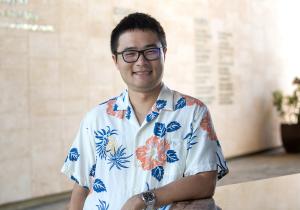UH Cancer Center leads $3.5M study to improve prostate cancer risk prediction
University of Hawaiʻi at MānoaProstate cancer is one of the most commonly diagnosed, deadliest cancers for men in Hawai’i. To increase public understanding of the causes of prostate cancer, the University of Hawaiʻi Cancer Center will lead a $3.5 million research study to further our understanding of prostate cancer to improve prediction of future disease.
Annually, an average of 855 men are diagnosed with invasive prostate cancer in the state, with 95% of prostate cancers being diagnosed at age 55 years and older. Filipinos had the highest proportions of advanced stage prostate cancers at 35%. An average of 125 men die of prostate cancer in Hawai‘i each year. See more statistics from the Hawaiʻi Tumor Registry.
Funded by the National Cancer Institute, the research team is led by UH Cancer Center Assistant Professor Lang Wu. Wu’s aim is to apply his findings across a variety of populations, including at-risk ethnic groups in Hawaiʻi and the Pacific.
As principal investigator, Wu will lead a research team, investigating the causes of both overall and aggressive prostate cancers through novel methods across African and European populations in the U.S., and other countries. They will identify proteins that play a role in the development and progression of prostate cancer.
“For prostate cancer, substantial efforts have been made to identify high-risk populations to improve prostate cancer screening,” Wu said. “However, the performance of available prostate cancer risk predictive models remains unsatisfactory. Through this study, we hope to generate new knowledge to improve the understanding of prostate cancer etiology (causes) and risk assessment.”
Wu also aims to develop and validate useful predictive models for prostate cancer risk and aggressiveness by incorporating information of the newly determined proteins with genetic and non-genetic information, and applying multiple novel statistical methods.
The expectation is that developing improved predictive models can help identify individuals who are at a high risk of developing prostate cancer.
About the University of Hawaiʻi Cancer Center
The University of Hawaiʻi Cancer Center through its various activities, including scientific research and clinical trials, adds more than $57 million to the Oʻahu economy. It is one of only 71 research institutions designated by the National Cancer Institute. An organized research unit within the University of Hawaiʻi at Mānoa, the UH Cancer Center is dedicated to eliminating cancer through research, education, patient care and community outreach with an emphasis on the unique ethnic, cultural, and environmental characteristics of Hawaiʻi and the Pacific. Learn more at https://www.uhcancercenter.org. Like us on Facebook at https://www.facebook.com/UHCancerCenter. Follow us on Twitter @UHCancerCenter.

